For companies seeking to optimize their customer relationship management, hiring a Salesforce Developer is a strategic move. These developers are crucial for customizing Salesforce solutions to meet unique business needs, enhancing the platform's capabilities, and driving overall operational efficiency. However, many hiring managers misunderstand the developer's role, often confusing it with that of a Salesforce Administrator, which can lead to hiring mismatches.
This article provides a comprehensive guide to hiring a Salesforce Developer. We'll cover the role's responsibilities, the hiring process, key skills and qualifications, and how to structure interviews. For more insights, you can refer to our Salesforce Developer Interview Questions.
Table of contents
What Does a Salesforce Developer Do?
A Salesforce Developer specializes in using the Salesforce platform to build custom applications and solutions tailored to a business's unique needs. They work closely with stakeholders to integrate Salesforce products and services into existing systems, ensuring seamless functionality and improved business processes.
Typical responsibilities of a Salesforce Developer include:
- Designing and developing customized solutions within the Salesforce platform.
- Implementing and testing user-friendly interfaces that meet organizational requirements.
- Collaborating with other IT professionals to integrate Salesforce applications with third-party systems.
- Maintaining and upgrading existing Salesforce applications to enhance their functionality.
For a detailed list of skills required for this role, you can refer to skills required for Salesforce Developer.
Salesforce Developer Hiring Process
The Salesforce Developer hiring process typically spans 4-6 weeks. Here's a quick overview of the timeline and key steps:
- Post a well-crafted job description on relevant job boards
- Review resumes and applications (1-2 weeks)
- Conduct initial screening calls (3-5 days)
- Administer Salesforce Developer skill assessments (3-5 days)
- Schedule technical interviews (1-2 weeks)
- Conduct final round interviews (2-3 days)
- Make job offer and negotiate (2-3 days)
This process allows you to thoroughly evaluate candidates' Salesforce expertise, coding skills, and cultural fit. In the following sections, we'll dive deeper into each step, providing tips and best practices to help you find the ideal Salesforce Developer for your team.
Key Skills and Qualifications for Salesforce Developers
When building a candidate profile for a Salesforce Developer, it's important to distinguish between must-have skills and nice-to-have qualities. This distinction helps focus your search and ensures you're not missing out on great candidates who might not tick every box.
Here's a quick overview of the skills and qualifications to look for in a Salesforce Developer. Remember, the importance of each skill may vary based on your specific project needs and team structure.
Required skills typically include:
- Bachelor's degree in Computer Science or related field
- 3+ years of Salesforce development experience
- Proficiency in Apex, Visualforce, and Lightning Web Components
- Salesforce Developer Certification
- Strong problem-solving and analytical skills
Preferred qualifications might encompass:
- Experience with Salesforce CPQ and Marketing Cloud
- Knowledge of JavaScript, HTML5, and CSS3
- Familiarity with Agile methodologies
- Experience integrating third-party applications
- Additional Salesforce certifications
To thoroughly evaluate these skills, consider using coding tests tailored for Salesforce development. This approach can help you objectively assess a candidate's technical abilities and problem-solving skills in a practical setting.
| Required skills and qualifications | Preferred skills and qualifications |
|---|---|
| Bachelor's degree in Computer Science or related field | Experience with Salesforce CPQ and Salesforce Marketing Cloud |
| 3+ years of experience in Salesforce development | Knowledge of JavaScript, HTML5, and CSS3 |
| Proficiency in Apex, Visualforce, and Lightning Web Components | Familiarity with Agile development methodologies |
| Salesforce Developer Certification | Experience with integrating third-party applications |
| Strong problem-solving and analytical skills | Additional Salesforce certifications |
10 Platforms to Hire Salesforce Developers
Now that we have a job description ready, it's time to list on job boards to attract potential candidates. Posting on the right platforms is essential for reaching qualified Salesforce Developers who can meet your specific needs.
LinkedIn Jobs
Ideal for posting full-time Salesforce Developer positions. Offers extensive reach and allows detailed job descriptions with company branding.

Dice
Specialized job board for tech roles. Useful for targeting experienced Salesforce Developers with specific skills and certifications.
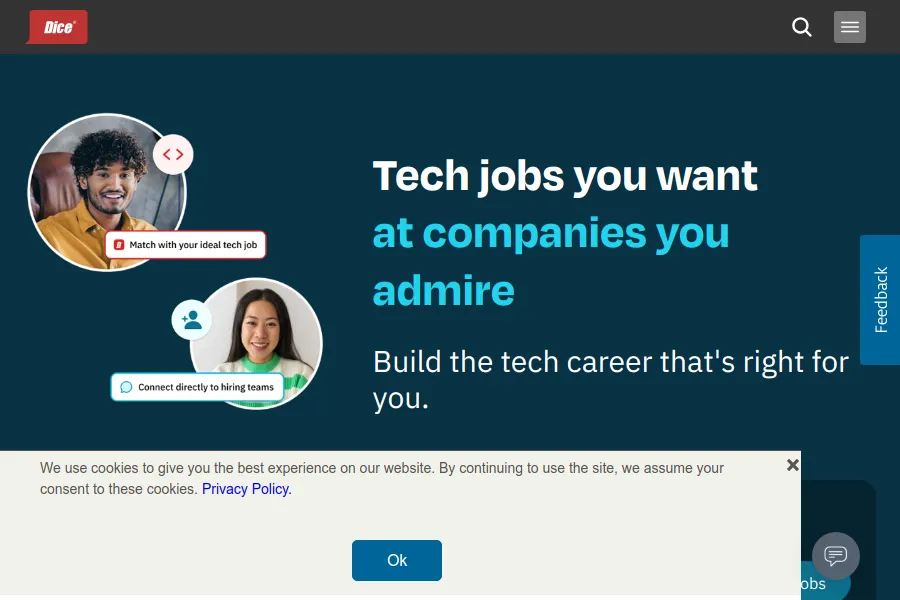
Upwork
Excellent for hiring freelance Salesforce Developers for project-based work or short-term contracts. Offers escrow services and time tracking.

Some effective platforms include LinkedIn Jobs for full-time positions, Dice for tech-specific recruitment, and Upwork for freelance talent. Each of these platforms has unique strengths, making them suitable for different hiring scenarios, whether you're looking for full-time employees or short-term contractors.
How to Screen Salesforce Developer Resumes
In the hiring process for a Salesforce Developer, resume screening is a key step to narrowing down the pool of applicants. You want to identify candidates who truly match the job requirements, ensuring a more focused and efficient interview process. This not only saves time but also helps in finding the best fit for your organization.
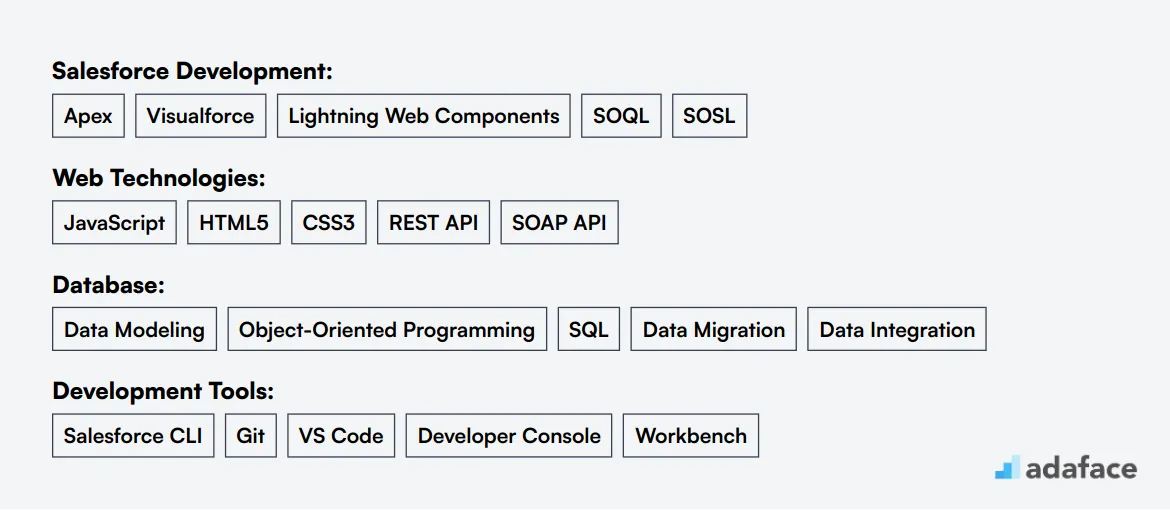
When manually screening resumes, it's important to look for specific skills and qualifications, such as expertise in Salesforce development tools like Apex, Visualforce, and Lightning Web Components. Additionally, check for required certifications like the Salesforce Developer Certification and strong problem-solving skills. These keywords help pinpoint candidates who possess the necessary technical expertise.
Incorporating AI language models can streamline resume screening by automating the keyword matching process. Tools like ChatGPT or Claude can assist by parsing resumes for you and identifying candidates with the most relevant skills. This approach saves time and can help you focus on candidates who meet your organization's needs.
Here's a sample prompt to utilize AI for resume screening: ```TASK: Screen resumes to match job description for Salesforce Developer role
INPUT: Resumes
OUTPUT: For each resume, provide following information:
- Email id
- Name
- Matching keywords
- Score (out of 10 based on keywords matched)
- Recommendation (short recommendation of whether to shortlist this candidate or not)
- Shortlist (Yes, No or Maybe)
RULES:
- If you are unsure about a candidate's fit, put the candidate as Maybe instead of No
- Keep recommendation crisp and to the point.
KEYWORDS DATA:
- Apex, Visualforce, Lightning Web Components
- Salesforce Developer Certification
- JavaScript, HTML5, CSS3 ``` For more detailed insights, check out our Salesforce Developer Interview Questions or explore our Salesforce Developer Test to better understand the skills needed.
Recommended skills tests for assessing Salesforce Developers
Skills tests are an effective way to evaluate Salesforce Developer candidates beyond their resumes. They provide objective insights into a candidate's technical abilities and problem-solving skills. Here are five recommended tests to assess potential Salesforce Developers:
Salesforce Developer Test: This Salesforce Developer test evaluates proficiency in Apex programming, Visualforce, Lightning components, and Salesforce integration. It helps identify candidates with strong Salesforce-specific development skills.
JavaScript Test: A JavaScript online test is valuable for assessing a candidate's ability to work with client-side scripting in Salesforce. It covers core concepts and advanced topics relevant to Salesforce development.
Java Test: While not directly used in Salesforce, a Java online test can gauge a candidate's general programming skills and object-oriented concepts. These skills often translate well to Apex programming in Salesforce.
SQL Test: An SQL online test helps evaluate a candidate's database querying skills. This is important for Salesforce Developers who need to work with SOQL and data manipulation within the platform.
Cloud Computing Test: A cloud computing online test can assess a candidate's understanding of cloud technologies and principles. This knowledge is beneficial for Salesforce Developers working in a cloud-based environment.
Structuring the Interview Stage for Hiring Salesforce Developers
After candidates have successfully cleared the skills tests, it's time to move them into the technical interview phase. This is where their hard skills will be put to the test. While skills tests are great for filtering out unfit candidates, they might not necessarily pinpoint the best fit for your needs. During this stage, asking the right questions is key to identifying top-notch Salesforce developers.
Here are some example interview questions to consider: 1. How would you approach designing a Salesforce application for a client with unique business processes? This tests their problem-solving skills and creativity. 2. Describe a challenging integration task you've completed using Salesforce APIs. Understanding their experience with REST API and other integration tools is crucial. 3. Can you walk us through how you would optimize performance for a Salesforce solution? This question assesses their technical depth and knowledge of system optimization. 4. How do you ensure data security and privacy in Salesforce applications? Data protection is a key aspect, and their answer can reflect their knowledge in this area. 5. What strategies do you use to stay updated with the latest Salesforce features and releases? This checks their commitment to continuous learning and staying updated in their field.
Understanding the Costs of Hiring a Salesforce Developer
When hiring a Salesforce Developer, it's important to consider the average salary range which typically falls between $81,690 and $157,675 in the United States. Factors such as location, experience level, and specific skill sets can significantly influence these numbers.
In cities known for their competitive tech job market like Washington DC, Chicago, and Dallas, salaries can reach upwards of $176,832. It's crucial to factor in these variances when budgeting for your hiring process.
Salesforce Developer Salary in the United States
The average salary for Salesforce Developers in the United States ranges from $81,690 to $157,675, with a median of $113,492. These figures vary based on factors like location, experience, and specific skills.
Top-paying cities include Washington DC, Chicago, and Dallas, where salaries can reach up to $176,832, $161,798, and $150,082 respectively. New York and San Francisco, despite their high cost of living, offer comparatively lower salaries in this field.
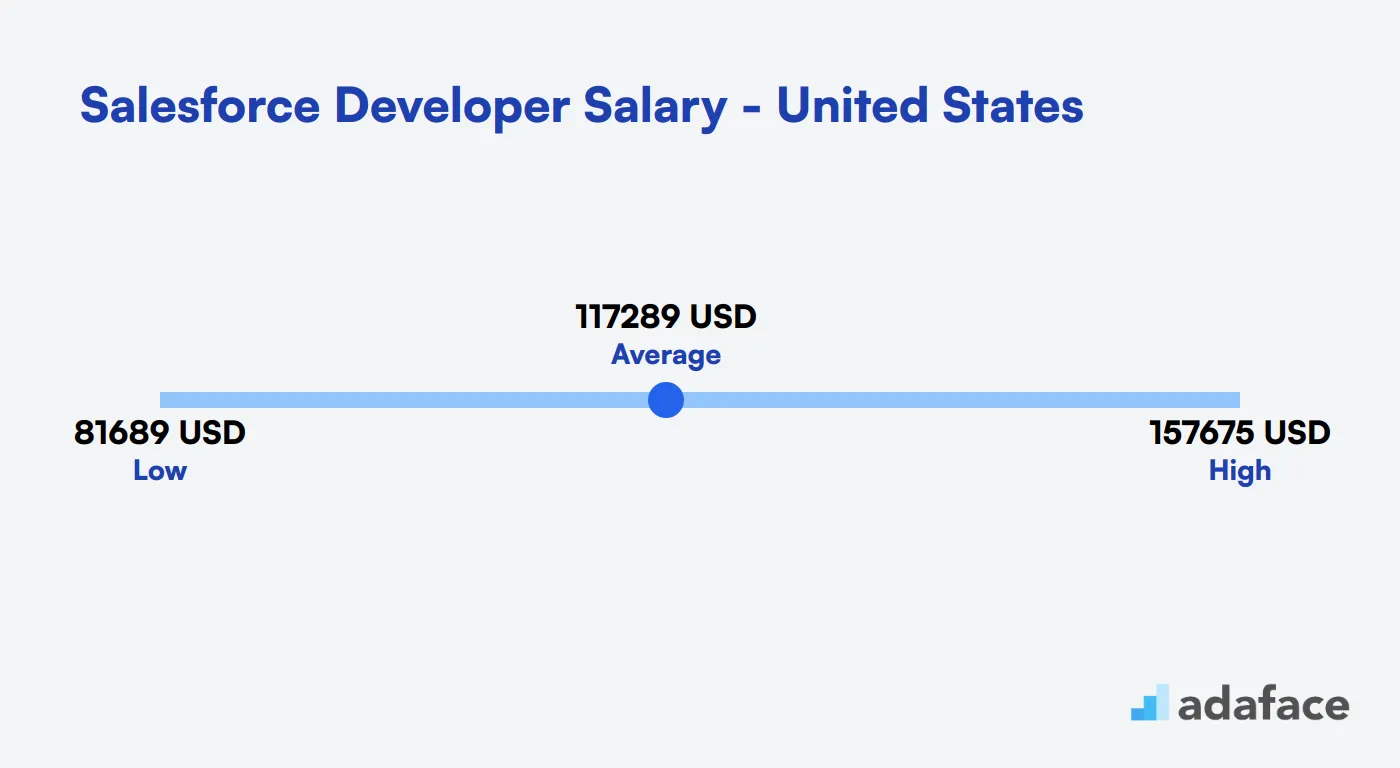
Salesforce Developer salary United Kingdom
In the United Kingdom, the average salary for a Salesforce Developer is around £50,000 per year. Entry-level positions typically start at £30,000, while experienced developers can earn up to £80,000 or more, depending on their skill set and location. These figures can vary based on the demand for Salesforce expertise and company size.
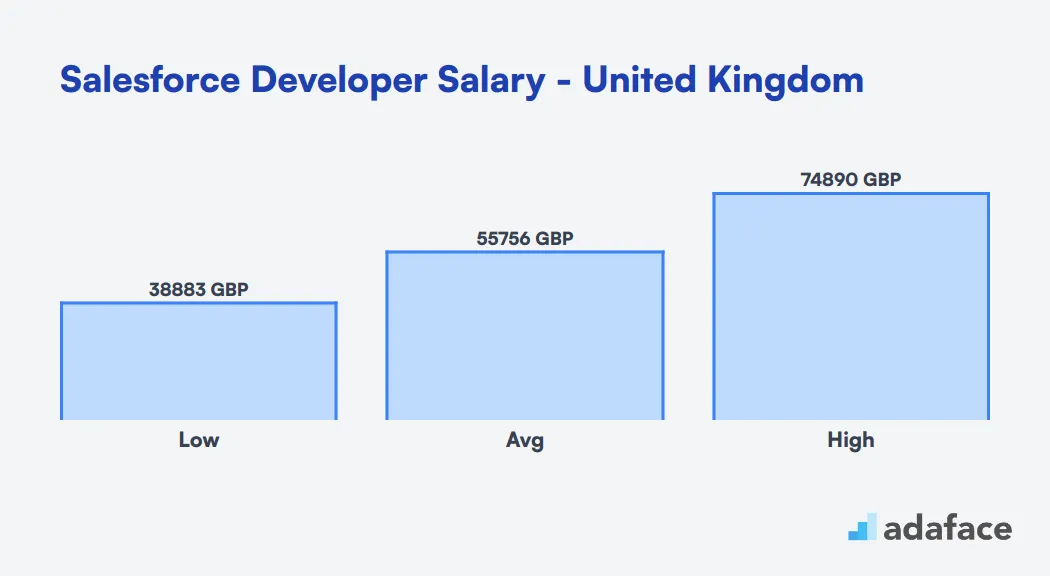
Salesforce Developer Salary in Australia
In Australia, the average salary for a Salesforce Developer varies significantly based on location and experience. Generally, salaries range from $82,936 to $161,558, with a median salary of around $115,754. Major cities like Sydney and Melbourne offer competitive salaries, with averages around $126,500 and $137,317 respectively.
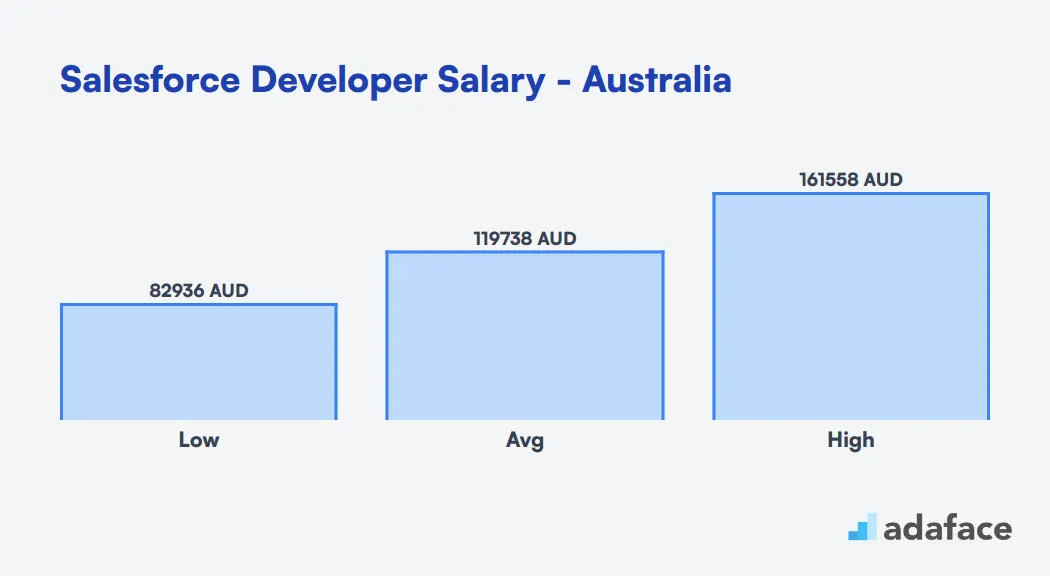
What's the difference between a Salesforce Admin and a Salesforce Developer?
While it's easy to confuse the roles of Salesforce Admin and Salesforce Developer, they cater to different needs within an organization. Recruiters often mix them up because both positions work within the Salesforce ecosystem but focus on distinct functionalities.
A Salesforce Admin primarily handles system configuration, utilizing point-and-click tools to manage user accounts and generate reports. Their tasks involve user management, optimizing processes, and ensuring that the system runs smoothly for end-users. They are typically certified as Salesforce Administrators and interact frequently with users.
Conversely, a Salesforce Developer specializes in custom code development, using languages like Apex and Visualforce to create complex applications and integrations. Their role leans more towards building custom features and application logic, thus requiring a deeper technical skill set. Developers usually possess a Salesforce Platform Developer certification and collaborate more with other developers than with end-users.
| Salesforce Admin | Salesforce Developer | |
|---|---|---|
| Primary Focus | System Configuration | Custom Code Development |
| Technical Skills | Point-and-click tools | Apex, Visualforce |
| Typical Tasks | User Management, Reports | Application Logic, Integrations |
| Certification | Salesforce Administrator | Salesforce Platform Developer |
| Problem Solving | Optimize Processes | Develop Custom Solutions |
| Typical Tools | Salesforce Setup Menu | Salesforce Developer Console |
| Role in Projects | Setup, Configure System | Build Custom Features |
| User Interaction | High, End-Users | Moderate, Other Developers |
What are the ranks of Salesforce Developers?
In the realm of Salesforce development, many people often confuse the various roles and ranks due to overlapping skills and responsibilities. Understanding the hierarchy is important for hiring managers and recruiters to find the right fit for their teams.
• Junior Salesforce Developer: This is an entry-level position where developers are usually fresh graduates or those with less experience. They assist in basic development tasks, troubleshooting, and learning the Salesforce platform under the guidance of senior developers.
• Salesforce Developer: A mid-level Salesforce developer typically has a few years of experience and is well-versed in Salesforce tools and technologies. They are responsible for designing and implementing custom solutions, as well as integrating Salesforce with other systems.
• Senior Salesforce Developer: This role requires extensive experience and a deep understanding of Salesforce architecture. Senior developers lead projects, mentor junior developers, and are responsible for complex problem-solving and ensuring best practices in development.
• Salesforce Technical Architect: At this rank, developers possess a vast knowledge of Salesforce and its ecosystems. They design the overall architecture for Salesforce applications and ensure that all components work seamlessly together, often liaising with stakeholders to align technical solutions with business needs.
Hire the Best Salesforce Developers for Your Team
In this guide, we've covered the key aspects of hiring Salesforce Developers. From understanding their role and the hiring process to identifying essential skills and qualifications, we've provided a roadmap for finding top talent.
If there's one key takeaway, it's the importance of using well-crafted job descriptions and skill assessments to make your hiring process more accurate. By implementing these strategies, you'll be better equipped to find Salesforce Developers who can drive your projects to success.
Salesforce Developer Test
FAQs
Salesforce Developers are responsible for designing, coding, and implementing Salesforce applications. They customize Salesforce solutions to meet business needs and integrate with other systems.
Key skills include proficiency in Apex and Visualforce, understanding of Salesforce Lightning framework, and experience with APIs and integrations. Strong problem-solving and communication skills are also important.
While both roles work with the Salesforce platform, Developers focus on coding and custom application development, whereas Administrators handle user accounts, maintenance, and system customization without coding.
You can find Salesforce Developers through platforms like LinkedIn, Upwork, or specialized job boards. Additionally, consider using platforms that offer pre-screened candidates.
Include responsibilities, required skills and qualifications, and any specific projects or technologies particular to your organization. Reference our Salesforce Developer Job Description for details.
Use coding tests and skills assessments focused on Salesforce technologies. You can find relevant tests on platforms like Adaface.
The hiring process includes defining role requirements, sourcing candidates, screening resumes, conducting skill assessments, and structuring interviews to evaluate both technical skills and cultural fit.

40 min skill tests.
No trick questions.
Accurate shortlisting.
We make it easy for you to find the best candidates in your pipeline with a 40 min skills test.
Try for freeRelated posts
Free resources



